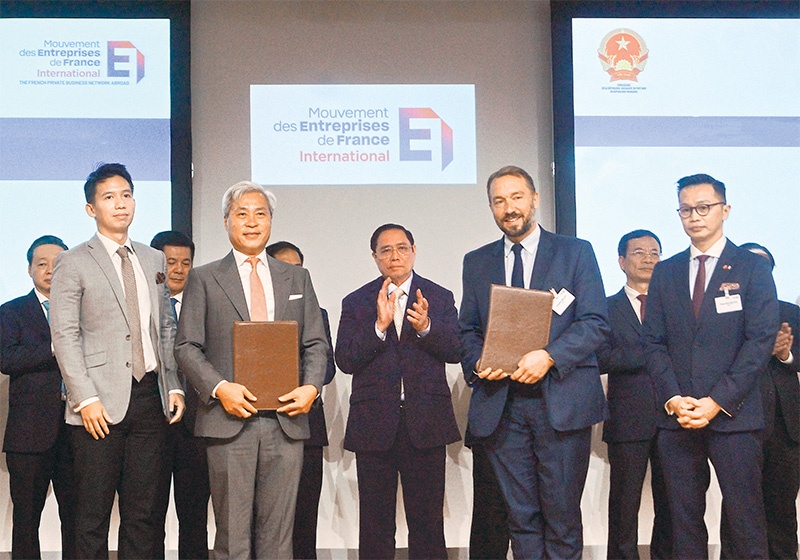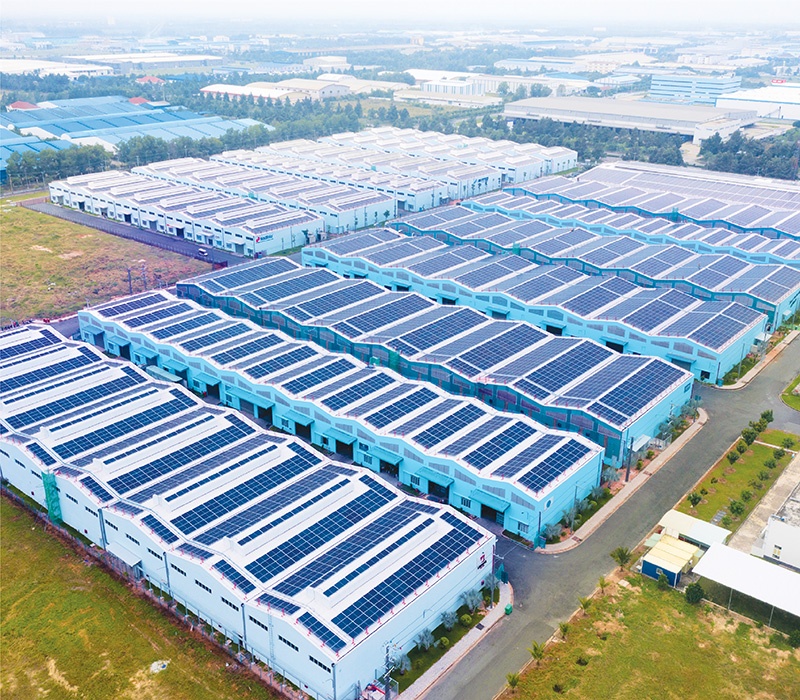VinaCapital – growing sustainably with Vietnam
After 18 years of operation in Vietnam, what is your current assessment of the investment environment in the country and the potential of the market post-pandemic?
 |
| Don Lam, co-founder and CEO |
The investment environment has changed a lot and only continues to improve. I have just returned from meetings with investors in Europe and North America, and one thing was clear: Vietnam continues to be seen as one of the world’s most dynamic and attractive markets for investment.
The pandemic hasn’t changed that. Before, Vietnam was growing quickly thanks to a large population, a growing middle class, low labour costs, steady economic growth, and a stable government.
This year will end on a strong note as the economy rebounds after months of social distancing and we’re confident that Vietnam will see continued strong investment inflows, whether via direct or indirect overseas investment. And it’s not just foreign investors who stand to benefit – we’ve seen a huge influx of Vietnamese who are now investing in the stock market.
Most sectors should do well in the medium and longer terms, with a few worth watching including industrial real estate, energy, and tourism and hospitality.
For the 10 months of 2021, the registered foreign direct investment reached approximately $24 billion, 1 per cent higher than the same period last year. This is a clear sign of confidence in Vietnam’s swift recovery and growth prospects. Industrial zones are expected to grow significantly to accommodate the continued strong shift of manufacturing to Vietnam, as companies continue to diversify their supply chains.
The energy sector will continue to attract capital given Vietnam’s planned electricity generation capacity expansion over the next 20 years, with a focus on cleaner sources. In total, we expect at least $100 billion to be invested into expanding energy generation capacity over the next decade.
Tourism and hospitality, probably the hardest-hit sector during the pandemic, will likely see dynamic growth once regulations are relaxed. In early 2022, we expect international travel to resume on a wider scale. Before the pandemic, international arrivals reached a record, and while it may take a little time for things to return to normal, we are confident that Vietnam will once again be a destination of choice for foreign tourists.
Which areas are a focus for VinaCapital currently, and how will it set out its comprehensive development strategy for the future?
As the only investment management firm offering products and platforms across all major asset classes, we focus on several areas. For example, for our listed equity and private equity investments, we prefer sectors like construction materials, which benefits from a strong housing market and infrastructure development, or consumer discretionary, healthcare, and education, which benefit from a growing middle class.
For our venture capital investment platform, the tech sector is its focus. We have a real estate group that is working on several residential projects as well as industrial parks.
Hospitality is another longstanding focus for us. And of course, we have been doing a lot of work in energy in recent years. All these sectors stand to benefit from Vietnam’s growth in the years ahead.
Our strategy is based on what we see happening in Vietnam and listening to investors, as well as the work of our research team, which ranks as one of the largest in the country. Then we determine the best ways that we and investors can access the market opportunities.
 |
| Vietnam’s registered foreign direct investment has so far this year reached approximately $24 billion, a percentage point higher than the same period of 2020. The country’s economic recovery and growth prospects are also being backed up by confidence from business associations, banks, and overseas groups, as well as through the reboot of industrial zone production. With that, the nation’s leading investment management company VinaCapital, and its co-founder and CEO Don Lam, are setting out a comprehensive development strategy that takes into account a post-pandemic future. Now, VinaCapital is going all-out to demonstrate its clean energy credentials by partnering with huge energy companies such as EDF Renewables to develop clean sources of electricity. |
Renewable energy will be one of the vital fields for VinaCapital’s long-term funding strategy in the country. What are your goals in this regard?
Vietnam has demonstrated its capability to accelerate clean energy solutions, quickly becoming the largest solar energy producer in Southeast Asia, reaching circa 17GW by end-2021. With this development rate, Vietnam will become Asia’s next green energy powerhouse within the next five years.
Vietnam has set out ambitious targets to achieve net zero carbon emissions by 2050, and renewables will play a pivotal role in facilitating the government’s goal of decreasing reliance on fossil fuels, and ensuring energy security. The ratio of renewables to total installed capacity has increased to 30 per cent in 2030, in comparison to only 16 per cent in the amended National Power Development Plan VII. Specifically, the planned capacity for solar and wind combined in 2025 and 2030 is 30GW and 34GW, respectively.
Meanwhile, wind generation capacity will continue to rise. Currently, there is less than 4GW of capacity, much less than the 11.8GW expected in the 2025-2030 period. Offshore energy will become the next big thing as the government has made ample capacity allocation for offshore wind in the medium- and long-term (36GW until 2045). We expect that these markets will be highly competitive.
Direct power purchase agreements will be an interesting opportunity for seasoned energy investors in the coming years. The Ministry of Industry and Trade is preparing a pilot scheme allowing for direct supply from power plants to consumers, starting with 1GW and representing a small step towards a freer energy marketplace in Vietnam. In addition, this also comes with green renewable certificates, which many international companies seek as they can be traded on public markets, providing an additional revenue source.
 |
| SkyX’s project in Dong Nai province |
How has VinaCapital been carrying out work towards these goals of developing renewable energy through current projects?
For liquefied natural gas (LNG), VinaCapital has partnered with GS Energy, one of the largest South Korean energy conglomerates, to develop a 3000MW power plant in the Mekong Delta province of Long An. Once completed, this plant will be one of the largest in the south, supplying more than 5 per cent of the national electricity demand. Despite pandemic headwinds, the project is moving forward and is on track to commence operation in 2026/2027. This power complex will act as a transitional and cleaner energy solution for Vietnam as it moves towards its long-term net zero target.
In solar, we announced significant investment from French group EDF Renewables in our rooftop solar subsidiary SkyX. We are also in advanced discussions with leading European and US players regarding other renewable energy projects. We aim to invest in 2GW of such projects by 2025.
Beyond these current projects and initiatives, we are actively exploring other innovative energy technology solutions that could be applied in Vietnam, such as battery storage and smart-grid connections. We are closely monitoring the development of new energy sources, such as biomass power plants, small modular reactors, and hydrogen. These and other next-gen technologies will be critical to meeting both electricity demand and environmental commitments, and we intend to play an ongoing role in the continued development of renewables in Vietnam well into the future.
Why were EDF Renewables and GS Energy selected for VinaCapital’s renewable energy power plants?
We are pleased to have the opportunity to partner with companies like EDF and GS, both experienced global players in what they do. EDF is the global leader in renewable energy, with unmatched capability and expertise. They operate 28GW of renewable capacity as of 2020 in over 20 different countries and aim to increase to 50GW in eight years’ time. GS Energy is also the leading LNG power plant and terminal developer in South Korea.
Having the right partner is critical for a project’s success because they bring world-class in-house technical expertise and strong track records and credentials from having undertaken projects like these, as well as financial capacity.
Apart from energy, are there other areas related to infrastructure development that are of interest to private investors?
We know of several international investors who have expressed potential interest in other types of strategic infrastructure projects, such as seaports and highways, which are important to supporting Vietnam’s continued economic growth but are very complex and expensive.
The government can’t be expected to pay for it all. However, for there to be greater interest and investment from the private sector, the public-private partnership regulations need to be reformed to make them more appealing to private investors – at present, the economics make such moves difficult. If done properly, we’re confident more private investors would step up and participate in the modernisation and expansion of infrastructure in Vietnam.
What the stars mean:
★ Poor ★ ★ Promising ★★★ Good ★★★★ Very good ★★★★★ Exceptional
Related Contents
Latest News
More News
- NAB Innovation Centre underscores Vietnam’s appeal for tech investment (January 30, 2026 | 11:16)
- Vietnam moves towards market-based fuel management with E10 rollout (January 30, 2026 | 11:10)
- Vietnam startup funding enters a period of capital reset (January 30, 2026 | 11:06)
- Vietnam strengthens public debt management with World Bank and IMF (January 30, 2026 | 11:00)
- PM inspects APEC 2027 project progress in An Giang province (January 29, 2026 | 09:00)
- Vietnam among the world’s top 15 trading nations (January 28, 2026 | 17:12)
- Vietnam accelerates preparations for arbitration centre linked to new financial hub (January 28, 2026 | 17:09)
- Vietnam's IPO market on recovery trajectory (January 28, 2026 | 17:04)
- Digital economy takes centre stage in Vietnam’s new growth model (January 28, 2026 | 11:43)
- EU Council president to visit Vietnam amid partnership upgrade (January 28, 2026 | 11:00)

 Tag:
Tag:




















 Mobile Version
Mobile Version